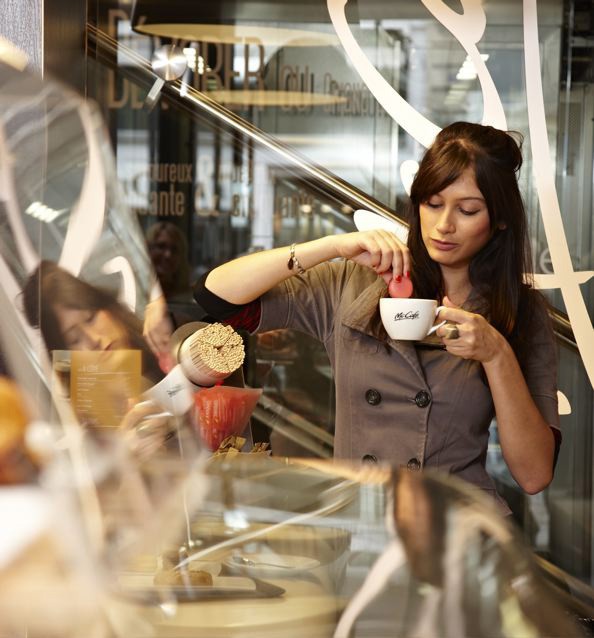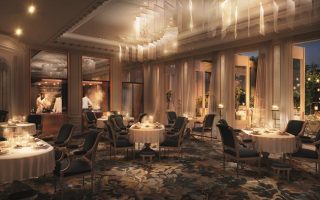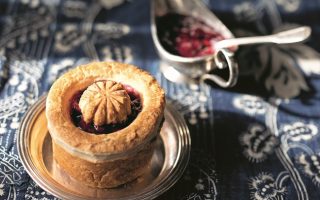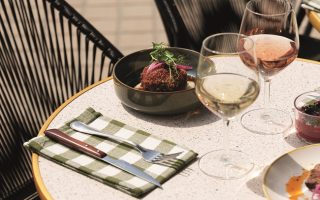How About a Big Mac au Poivre?

Cliché #1: Americans are fat porkers who eat junk food at McDonald’s all day long.
Cliché #2: The French eat so well, and have such exquisitely fine-tuned palates, that lots of Americans cross the Atlantic just to get a taste of that merveilleuse cuisine.
Only the second part of Cliché #2 is true. A lot of American do fly over to visit our country and eat some of the best meals of their lives. As for the rest, the notion seriously needs to be amended. For starters? One simple fact: the second most profitable market in the world for McDonald’s, right behind the US, is France. Yep.
That’s what I discovered when I was researching a story which would eventually turn into a documentary for French television. This is the kind of news that turns up with one single, simple Google search. No one tries to conceal it from the public. So how come it didn’t make headlines in the land of wine, cheese and great chefs? Was it shame? Sheer chance? My guess is that the statistic is so unsurprising to the French that no one felt impelled to make a big deal of it.
The figures speak for themselves. Each day, some 1.7 million customers eat at McDonald’s in France, to the cash register ring of about €3.9 billion a year. To give you an idea, that’s about the same amount the government lost when the value-added tax (VAT) was recently lowered from 19.5% to 5.5% for the entire French catering industry.
Secret passion
McDonald’s—or McDo, as the French call it (rhymes with slow)—is a giant company employing some 63,000 people in France, and opening about 40 new outlets every year, for a total—including franchises—nearing the 1,500 mark. And McDo is number one in providing the French with “French” fries and hamburgers. Hence the title of the documentary, McDo: Une Passion Française. A French passion.
What went wrong? How come a country so proud of its cuisine turned so massively to McDonald’s? Why, in a land where McDonald’s product is often identified as merde, does McDo sell so many hamburgers? Part of the answer is that every passion has its own complicated reasons. Another factor is that the French are terrible at anger management.
The story starts in 1979 when McDonald’s officially opened its first restaurant in Strasbourg. Officially is the operative word. In fact, McDonald’s gave France a first try in 1971 and opened a dozen outlets before deciding to really give the French market a go. Then from 1979 to 1999 McDonald’s silently invaded France. TV news footage from the 1980s shows French customers with terrible haircuts and weird-looking clothes eager to eat hamburgers and fries. In commercials French families and kids played with Ronald McDonald. It turned out that, in spite of the so-called cultural exception, the French behaved just like the Americans, the Dutch and the British: give them cheap fast food and they’ll eat it.
1998 was no different. As the French soccer team won the World Cup on their home ground, its main sponsor was McDonald’s, as goalkeeper Fabien Barthez starred in a TV ad promoting the Big Mac. A year earlier McDonald’s had proposed its first hamburger with a French twist—the McDeluxe, with a mustard-based sauce. The brand also created a new French fry: the potato. It is fried, but it isn’t shaped like a stick, it looks like a potato quarter. Designed for the particular taste of the French, it came with a special white sauce.
The angry raid
But then, on August 12, 1999, the love affair was cut short as a bunch of wild French sheep breeders rampaged through a McDonald’s in the town of Millau, in the southern Aveyron region. They were led by a long-time ecology-minded slow food activist, famous for his moustache ever since, José Bové. But if Bové tactfully called the rampage a “dismantling“, in fact the anti-McDo movement was born.
Bové and his paysan buddies made headlines the world over. Hordes of Gauls crashing into a McDonald’s was pure journalistic gold. Officially, the raid was to protest against tariffs the US had imposed on 60 European products including Roquefort, the blue-veined sheep cheese made exclusively in Roquefort-sur-Soulzon, a town just south of Millau.
The US had lost a battle at the World Trade Organization, which upheld a European Union decision to ban imports of hormone-laden US beef, and had imposed the 60-product tariffs in retaliation.
For José Bové the new tariffs were unfair. “Dismantling this McDonald’s was the only way to make ourselves heard,” he said. “Had it been another fast-food restaurant we would have dismantled it as well,” he added, denying that he had some kind of specific anti-McDo bias. Really? Was the target just an accident? Nothing really particular against McDo?
Wrong. For it also turned out that, a few weeks before the dismantling, a dark-bearded man wearing a dark suit and a dark shirt went to Millau with a speech to make: Paul Ariès, a left-wing political scientist. In January 1999 he had published his Little Treatise Against McDonald’s, a corrosive pamphlet denouncing the American giant, and he was touring France making speeches against McDo. In Millau he had received a warm welcome. “When I went to Millau to make my speech people were mad,” he says. “The next day the local newspaper asked in its headlines ‘What is the population of Millau going to do?’ France has always been the country of cuisine—it’s part of our identity. And if McDo became a political pawn, it’s because one cannot attack the French table without being punished.” If Paul Ariès hadn’t travelled to Millau to make that speech in mid-1999, it is likely that France wouldn’t be McDo’s second most profitable market today.
Battle joined
After Millau, the battle for France began. McDonald’s launched a new offensive. The first move was audacious. Responding to Bové’s anti-globalization stance, McDo presented itself as a French company. In 2001 they invested in the Salon de l’Agriculture, France’s biggest agricultural fair. “It could have been seen as a provocation, since José Bové was a symbol for peasants and the land, but it worked,” says Frédéric Fréry, strategy professor at the ESCP business school in Paris. “Seventy-five percent of McDo’s supplies come from France. The company has a very good relationship with French farmers, since McDo is one of their biggest customers.”
McDo also devised a bunch of new weapons. First they created new products, including a large choice of different hamburgers—you can now have a McDo with goat cheese, blue cheese or Cantal cheese au poivre—balanced with more salads—try Spicy West, Farmer or Caesar—and fruit— anyone for a Petit Kiwi on a popsicle stick?
Secondly, they realized that the French weren’t exactly like Americans—they used McDo the French way, taking their time to eat. Surveys also reported that McDo is a place of high conviviality, a value that the French link to eating. Hence the physical remodeling of French McDos, trans- forming the fast-food outlets into welcoming restaurants. Then there were massive advertising campaigns aimed at changing France’s perception of McDo. And with all that, McDo made it happen. In 2002 McDo’s French turnover was €2.2 billion, and it shot up to €3.9 billion today. “In the end,” says Fréry, “I believe that Bové helped McDonald’s. He gave them a push.”
Take the new McDo in Beaurains, near Arras. At the opening last October, the place was spic and span, the interior design elegant and trendy, the employees seemed proud.
So was mayor Pierre Ansart, who attended the opening along with some 200 fellow citizens, happy to welcome the creation of 50 jobs. José Bové and the anti-McDo movement appeared to be long gone. Indeed, the current French McDonald’s is light years away from the purely American version prevailing in France a decade ago.
McCafé arrived in France in 2004, and there are now McCafé coffee shop corners in 116 McDo outlets and more are on the way. A Parisian McCafé offers a standard French espresso, for example, that tastes better than one costing twice the price in the average bistrot, as well as croissants and also macarons made by Holder—the same company that manufactures the famed macarons for Ladurée, a prime symbol of French savoir-faire. Except that once again, McDo’s price is highly competitive. And of course, as the character Vincent Vega noted in Quentin Tarantino’s movie Pulp Fiction: “In Paris, you can buy a beer in a McDonald’s.” And wine, too, he might have added. The French mission has been McComplished.
On target
Some don’t see it that way, of course, and resistance is still in order. When I asked Jean-Luc Petitrenaud, a French food writer and TV presenter, for his thoughts on France’s silver medal for McDo-eating, he gave me a staggering reply: “People eat American sandwiches because they don’t want to treat themselves well. It’s a bit as if they didn’t want to shower, or use creams on their skin.”
But are 1) being French, 2) loving French cuisine, and 3) eating at McDonald’s so antithetical? Jean-François Mallet, a former chef turned photographer, doesn’t think so. Author of an outstanding book entitled Take Away, Mallet has a passion for what he calls street food, and ordinary dishes we eat everyday. From that perspective, McDo’s success makes a lot of sense. “What’s the French national dish? Steak frites,” he says. “And what does McDo do? Ground steak and fries. True, they put that into some bread, but they’re pretty much on the national target!”
So should the French fear the expansion of McDo? That’s what I asked François Simon as we were eating together at McDo. Simon is probably France’s most eminent food critic, and reputedly an inspiration for Anton Ego, the food critic in the animated film hit Ratatouille. While munching on a fry he said: “I’m not shocked. When a culture is strong it can allow for such alien elements to invade it—sushi, pizzas, hamburgers, all that’s OK to me. No need to worry about it.” A hamburger, a coke, the remaining fries and a McFlurry were also on the table, as ready evidence. But they didn’t last long.
Originally published in the March 2011 issue of France Today
Share to: Facebook Twitter LinkedIn Email



